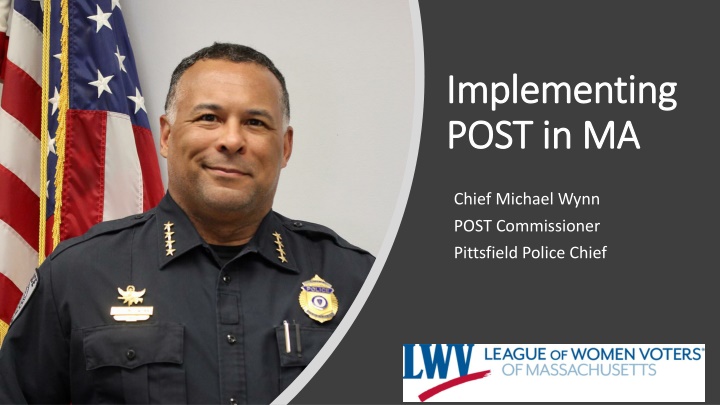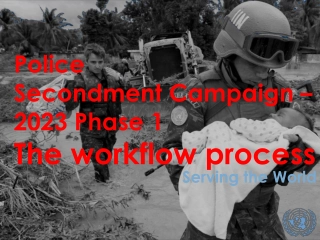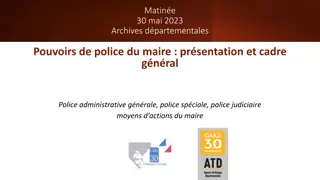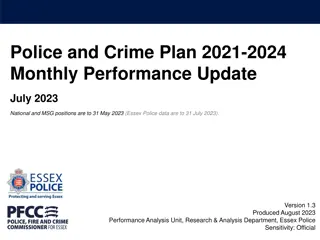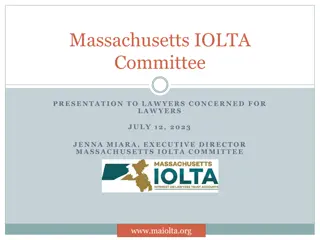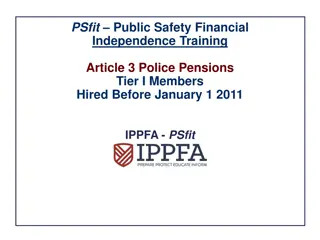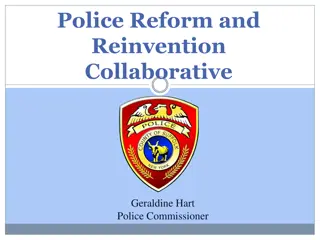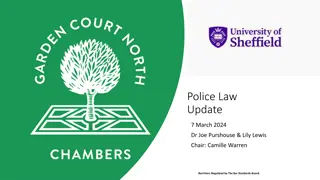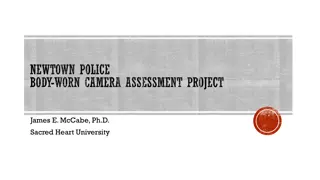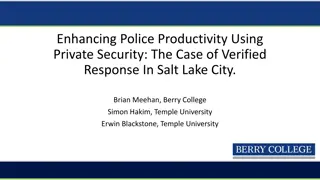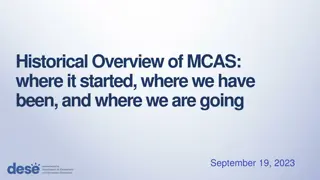Comprehensive Overview of Police Reform in Massachusetts
This comprehensive overview delves into the recent police reform initiatives in Massachusetts, highlighting critical aspects such as the creation of the Peace Officer Standards and Training Commission, regulations on the use of force, limitations on facial recognition technology, prohibition of no-knock warrants, and increased transparency in law enforcement misconduct records. It also covers the establishment of special commissions to address structural racism in correctional facilities, probation, and the parole process, along with the significant changes in the roles and responsibilities of School Resource Officers.
Download Presentation

Please find below an Image/Link to download the presentation.
The content on the website is provided AS IS for your information and personal use only. It may not be sold, licensed, or shared on other websites without obtaining consent from the author.If you encounter any issues during the download, it is possible that the publisher has removed the file from their server.
You are allowed to download the files provided on this website for personal or commercial use, subject to the condition that they are used lawfully. All files are the property of their respective owners.
The content on the website is provided AS IS for your information and personal use only. It may not be sold, licensed, or shared on other websites without obtaining consent from the author.
E N D
Presentation Transcript
Implementing Implementing POST in MA POST in MA Chief Michael Wynn POST Commissioner Pittsfield Police Chief
Police Reform Overview Police Reform Overview An Act relative to Justice, Equity and Accountability in Law Enforcement in the Commonwealth Chapter 253 of the Acts of 2020 Creates Peace Officer Standards and Training Commission Develop Use of Force regulations including duty to intervene Reviews Civil Service System Creates 3 special commissions to study structural racism: in correctional facilities, parole process, and probation services Limits the use of facial recognition technology
Police Reform law continued Police Reform law continued Prohibits the use of no-knock warrants where minors or seniors are present School Resource Officers (SROs) hired at discretion of superintendent Allows public access to law enforcement misconduct records Prohibits a decertified law enforcement officer from claiming immunity in civil liability
Commissions Commissions Structural Racism in Correctional Facilities Structural Racism in Probation Structural Racism in Parole Process Civil Service Law Facial Recognition Qualified Immunity (LWVMA submitted written testimony) Persons with Disabilities Status of Black Men and Boys Status of LatinX
Use of Force Prohibitions Use of Force Prohibitions Physical force unless de-escalation attempted Deadly force unless de-escalation attempted Chokeholds Shooting into a moving vehicle unless necessary Tear gas, chemical weapons, dogs, or rubber bullets during protests except when de-escalation tactics have been attempted and failed necessary to prevent imminent harm/proportional response Requires reporting any use to the commission after the fact
School Resource Officers (SROs) School Resource Officers (SROs) Certification process by June 2022 Establishes Model School Resource Officer Memorandum of Understanding taskforce Discretion of the superintendent to request SRO Requires DESE to collect and publish data related to mental and social emotional health support personnel vs. number of school resource officers Prohibits sharing immigration status and citizenship information
Facial recognition Facial recognition Allowed after a written request to the RMV, FBI or State Police pursuant to a court order to obtain information required for an ongoing criminal investigation Report each facial recognition search to Executive Office of Public Safety and Security (EOPSS) Annual report
POST Commission POST Commission Nine members Appointed by Governor Baker and AG Healey Six members outside law enforcement, a current police chief, retired Superior Court judge and a social worker. Certification of police officers mandatory certification process decertification or suspension of certification reprimand in the event of certain misconduct Establish rules governing use of force by law enforcement officers Works with Municipal Police Training Committee (MPTC) as the primary training body for law enforcement officers
POST Commission continued POST Commission continued Civil enforcement agency for violations of this law Establish minimum officer certification Receive complaints of officer misconduct from any source Conduct adjudicatory proceedings Adopt, amend or repeal regulations Refer patterns of racial profiling or the mishandling of complaints investigation to the attorney general or federal, state or local authorities
Municipal Police Training Committee (MPTC) Municipal Police Training Committee (MPTC) POST Commission works with Municipal Police Training Committee (MPTC) as the primary training body for law enforcement officers MPTC is responsible for the development, delivery, and enforcement of training standards of municipal, MBTA, environmental, UMass, campus police officers, and deputy sheriffs performing police duties and function.
POST Commission Updates POST Commission Updates Executive Director Enrique Zuniga Hiring legal counsel, CTO, director of standards, and a director of certification Letter to all chiefs Sept. 30 requesting data related to disciplinary records. Released Use of Force rules October 2021 Guidelines related to minor children on June 30, 2021 8,000 officers up for certification in July 2022 Standards of police de-certification finalized by Dec. 31 and made available via public hearings
Resources Resources Full text of An Act relative to Justice, Equity and Accountability in Law Enforcement in the Commonwealth POST Commission Website Public meetings, meeting notes, and more Malegislature.gov commissions Sen. Brownsberger materials Reform+Shift+Build Act MA Chiefs of Police Association MPTC use of force regulations
